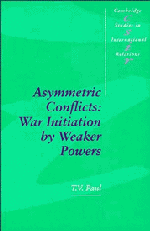Crossref Citations
This Book has been
cited by the following publications. This list is generated based on data provided by Crossref.
Elman, Miriam Fendius
1995.
The Foreign Policies of Small States: Challenging Neorealism in Its Own Backyard.
British Journal of Political Science,
Vol. 25,
Issue. 2,
p.
171.
Rubin, Jeffrey Z.
and
Zartman, I. William
1995.
Asymmetrical Negotiations: Some Survey Results that may Surprise.
Negotiation Journal,
Vol. 11,
Issue. 4,
p.
349.
Rubin, Jeffrey Z.
and
Zartman, I. William
1995.
Asymmetrical Negotiations: Some Survey Results that may Surprise.
Negotiation Journal,
Vol. 11,
Issue. 4,
p.
349.
Paul, T.V.
1995.
Time Pressure and War Initiation: Some Linkages.
Canadian Journal of Political Science,
Vol. 28,
Issue. 2,
p.
255.
Huntley, Wade
1996.
The kiwi that roared: Nuclear‐free New Zealand in a nuclear‐armed world.
The Nonproliferation Review,
Vol. 4,
Issue. 1,
p.
1.
Singer, J. David
1996.
Between Development and Destruction.
p.
35.
Arquilla, John
1997.
Nuclear weapons in South Asia: More may be manageable.
Comparative Strategy,
Vol. 16,
Issue. 1,
p.
13.
Paul, T. V.
1998.
The Nuclear Non-Proliferation Regime.
p.
56.
Rioux, Jean-Sébastien
1998.
A Crisis-Based Evaluation of the Democratic Peace Proposition.
Canadian Journal of Political Science,
Vol. 31,
Issue. 2,
p.
263.
Fischerkeller, Michael P.
1998.
David versus Goliath: Cultural judgments in asymmetric wars.
Security Studies,
Vol. 7,
Issue. 4,
p.
1.
Ben-Yehuda, Hemda
1999.
Opportunity Crises: Framework and Findings, 1918-1994.
Conflict Management and Peace Science,
Vol. 17,
Issue. 1,
p.
69.
Wolf, Aaron T.
1999.
Environmental Change, Adaptation, and Security.
p.
251.
Huth, Paul K.
1999.
DETERRENCE AND INTERNATIONAL CONFLICT: Empirical Findings and Theoretical Debates.
Annual Review of Political Science,
Vol. 2,
Issue. 1,
p.
25.
Geller, Daniel S.
2000.
Status Quo Orientation, Capabilities, and Patterns of War Initiation in Dyadic Rivalries.
Conflict Management and Peace Science,
Vol. 18,
Issue. 1,
p.
73.
Taliaferro, Jeffrey W.
2001.
Realism, power shifts, and major war.
Security Studies,
Vol. 10,
Issue. 4,
p.
145.
Vasquez, John A.
and
Gibler, Douglas M.
2001.
The steps to war in Asia, 1931–45.
Security Studies,
Vol. 10,
Issue. 3,
p.
1.
Blank, Stephen
2001.
Can Information Warfare Be Deterred?.
Defense Analysis,
Vol. 17,
Issue. 2,
p.
121.
Eaton, J. G.
2002.
The beauty of asymmetry: An examination of the context and practice of asymmetric and unconventional warfare from a Western/Centrist perspective.
Defence Studies,
Vol. 2,
Issue. 1,
p.
51.
Kang, David C.
2003.
International Relations Theory and the Second Korean War.
International Studies Quarterly,
Vol. 47,
Issue. 3,
p.
301.
Chamberlain, E.J.R.
2003.
Asymmetry: What is it and what does it mean for the British armed forces?.
Defence Studies,
Vol. 3,
Issue. 1,
p.
17.





